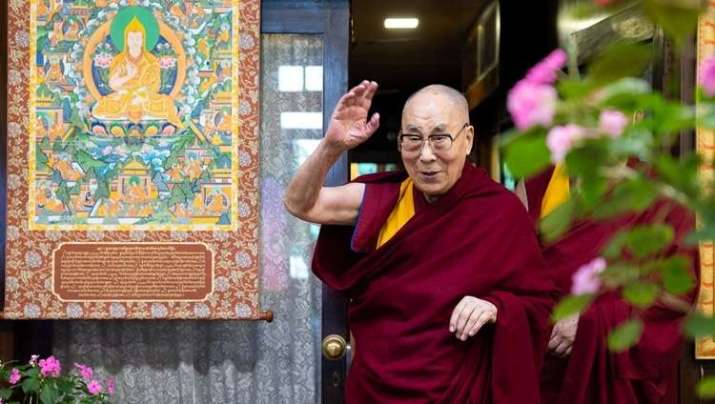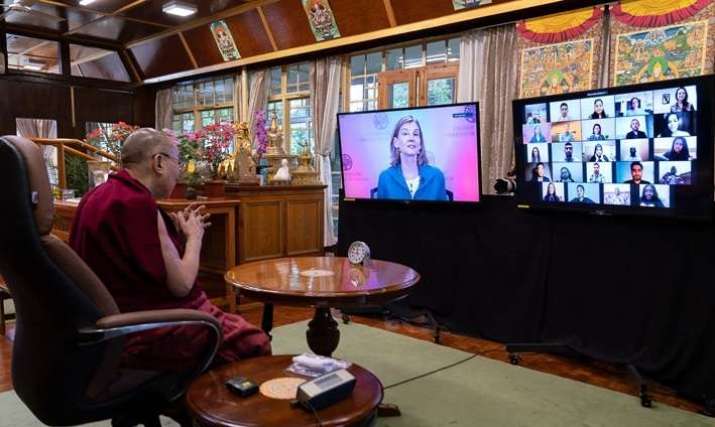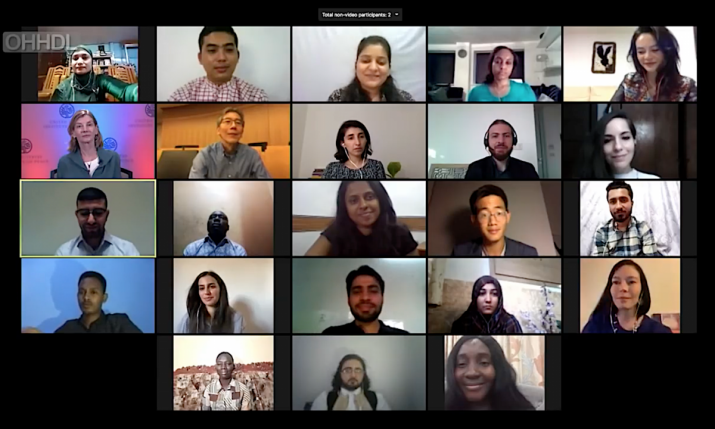NEWS
Dalai Lama in Dialogue with USIP on “Conflict, COVID, and Compassion”
 His Holiness the Dalai Lama greets the participants of the virtual Conflict, COVID, and Compassion dialogue. From dalailama.com
His Holiness the Dalai Lama greets the participants of the virtual Conflict, COVID, and Compassion dialogue. From dalailama.comHis Holiness the Dalai Lama engaged in a global dialogue on “Conflict, COVID, and Compassion” with the United States Institute of Peace (USIP) on 12 August, led by president and CEO Nancy Lindborg, and with a group of 20 young peace-builders known as Generation Change Fellows.
USIP has been bringing young leaders from conflict-affected regions for audiences with the Dalai Lama in Dharamsala, northern India for the past four years. There they explore topics ranging from cultivating compassion and forbearance on the path toward sustainable global peace, to building bridges between international leaders and young peace-builders. Due to the ongoing COVID-19 pandemic, this year’s dialogue was conducted virtually.
“As the world navigates the COVID-19 pandemic, rising conflict, and growing demands for justice, the need for individual, societal, and international compassion and resilience has never been more urgent,” USIP said in a statement. “These youths, part of the USIP network of Generation Change Fellows, live and work in the world’s most fragile and war-torn countries and have dedicated their lives to building peace in their communities.” (United States Institute of Peace)
USIP is a non-profit federal institute that promotes conflict resolution and prevention through research, analysis, and training individuals in diplomacy, mediation, and other peace-building measures. USIP works with local partners in conflict zones to prevent and resolve violent conflict, and to work toward a more peaceful, inclusive world. The participants of the Generation Change Fellows program, aged from 18–28, are actively working to manifest peace in their communities and societies by forming peace-building organizations or by taking on leadership roles in youth-led organizations.
“Many have faced war or have been uprooted by it. Some have lost friends or family to bloodshed, while others have lived in exile as refugees,” said USIP. “Out of a commitment to end or avert violence in their countries, these leaders have developed or guided projects to build bridges across social divides that keep youth on the periphery. They engage local, national, and international leaders to end the isolation and marginalization felt by youth in their communities, which is known to drive extremism.” (United States Institute of Peace)
Over the course of their discussion, the Dalai Lama emphasized that the COVID-19 pandemic, although perhaps the most imminent, was only one major threat facing the global community: “Another very serious issue is climate change and global warming. Scientists have predicted that if we don’t act to stop it, in the coming decades water sources, rivers and lakes, may dry up. An additional problem that will have to be addressed is the growing gap between rich and poor. Tackling these difficult circumstances will require that we work together.” (His Holiness the 14th Dalai Lama of Tibet)
Lindborg remarked that 12 August was also International Youth Day and with roughly half of the world’s young people living in regions directly affected by conflicts, she inquired what His Holiness’ perspective was for young people facing these monumental challenges.
“We live in a global economy with no natural boundaries,” the Dalai Lama responded. “And it seems to me that young people today are more broadminded than before. When I lived in Tibet, for example, I had only a limited view of the world. After coming to India, I was able to meet other people much more easily. It seems that young minds today are more open and that humanity is becoming more realistic—in those terms things are getting better.” (His Holiness the 14th Dalai Lama of Tibet)
His Holiness also observed that amid the coronavirus pandemic and its far-reaching ramifications, people should strive to cultivate a clearer view of reality in order to be less vulnerable to destructive emotions such as despondency. Although removing external problems may not be possible, he noted, in terms of our inner world and reality, people have the powerful and profound ability to develop tolerance, forgiveness, and contentment, regardless of events occurring externally.
 The Dalai Lama speaks with USIP CEO Nancy Lindborg and the Generation Change Fellows. Photo by Ven Tenzin Jamphel. From dalailama.com
The Dalai Lama speaks with USIP CEO Nancy Lindborg and the Generation Change Fellows. Photo by Ven Tenzin Jamphel. From dalailama.com“Having completed your studies, you young people are at the start of your real lives. Here and now in the 21st century, with the help of what scientists have learned about the brain, you need to learn how to achieve peace of mind. This is crucial since world peace can only be built by individuals who are at peace with themselves,” the Dalai Lama said. (His Holiness the 14th Dalai Lama of Tibet)
“Quantum physics tells us that things do not exist as they appear and yet most of our destructive emotions are rooted in the idea that things exist independently from their own side—as they appear to do,” he continued. “My number one commitment is to share with others the idea of achieving peace of mind and how to do it. Our world has become smaller and we can easily exchange information with each other. That’s a context in which we can try to develop more compassionate attitudes among our seven billion fellow human beings. One of the things we need to understand is that the real source of trouble for all of us is not something outside us but something here within. It’s our feelings of suspicion, fear and anger that we really need to subdue.” (His Holiness the 14th Dalai Lama of Tibet)
Throughout the dialogue, the Dalai Lama emphasized that, particularly in these times of crisis, it is important to reframe thought and perception beyond traditional notions of separate nations and communities. Rather, he said, young leaders need to think from a global perspective: humanity is facing problems that affect everyone and we must therefore work together for the common interest of all seven billion human beings.
“Time passes, things change, and we need to find new ways of thinking,” His Holiness concluded. “You young people are the ones who will contribute to making a new world. Don’t fall into old ways of thinking. Accept the new reality about the oneness of all human beings and face up to the challenge of global warming. Open your eyes and open your minds. . . . Let’s continue to work for the good of humanity with the goal of creating a better world. That’s our responsibility.” (His Holiness the 14th Dalai Lama of Tibet)
 Generation Change Fellows in dialogue with the Dalai Lama. From youtube.com
Generation Change Fellows in dialogue with the Dalai Lama. From youtube.comAt the time of writing, total global confirmed COVID-19 infections were reported to have reached 22.1 million, with 781,135 deaths so far recorded and 14.1 million recovered.* The World Health Organization in March estimated the mortality rate from the SARS-CoV-2 coronavirus, believed to have originated in Wuhan, China, at 3–4 per cent, based on incomplete and preliminary data, with the elderly and people with underlying health conditions considered most at risk. More recent data suggests that the mortality rate may be significantly lower, however studies are inconclusive due to variations in COVID-19 testing procedures in different countries, and differing methodologies for classifying and reporting COVID-19 as a cause of death.
See more
Conflict, COVID and Compassion (His Holiness the 14th Dalai Lama of Tibet)
The Dalai Lama Mentors USIP Youth Leaders (United States Institute of Peace)
United States Institute of Peace
Related news from Buddhistdoor Global
Low-key Celebrations amid Pandemic Caution as the Dalai Lama Turns 85
Dalai Lama Offers Simple Advice for Life in Isolation: Meditation and Compassion
His Holiness the Dalai Lama and Other Buddhist Leaders Answer “The Call to Unite”
COVID-19 a Lesson in “Universal Responsibility,” Dalai Lama Says on Earth Day
Audiences with Dalai Lama Halted Over Coronavirus Risk
Related features from Buddhistdoor Global
Buddhistdoor View: The Dharma of Unemployment
Buddhistdoor View: Education in the COVID-19 Era – Online Similarities to Religious Adaptations
Buddhistdoor View: Online Dharma – Temporary Measure or New Path For Buddhist Leadership?
Buddhistdoor View: Policing as Peacekeeping














